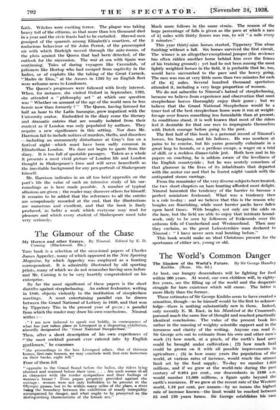The Glamour of the Chase My Horses and other Essays.
By Nimrod. Edited by E. D.
• Cuming. (Blackwood. 20s.)
Tars book is a selection of the occasional papers of Charles James Apperley, many of which appeared in the New Sporting Magazine, by which Apperley was employed as a hunting correspondent. It is admirably illustrated by old sporting prints, many of which we do not remember having seen before and Mr. Claming is to be very heartily congratulated on his enterprise.
By far the most significant of these papers is the short diatribe against steeplechasing. An ardent foxhunter, writing in 1840, objects violently to the institution of steeplechase meetings. A most entertaining parallel can be drawn between the Grand National of Lottery in 1839, and that won by Tipperary Tim in the present year of grace ; a parallel fttan which the reader may draw his own conclusions. Nimrod writes :—
• " I am now induced to speak out boldly, in consequence of what has just taken place at Liverpool in a disgusting exhibition, absurdly designated the Great National Steeplechase.' " Then, after a short description of his own experiences of most cocktail pursuit ever entered into by English gentlemen," he examines
".the proceedings in the late Liverpool affair. Out of thirteen tomes, first-rate fencers, we may conclude with first-rate horsemen on their backs, eight fell."
Four of them fell
" opposite to the Grand Stand before the ladies, the riders lying stunned and maimed before their eyes.. . . Are such scenes at all in character with the tender sy mpathies and finer feelings of woman's breast ? Even pagan propriety provided against the outrage: women were not only forbidden to be present at the Ol=ympic games, but to be within many miles of the place, a river bamig the boundary between the exhibition of manly intrepidity ficegmpeatied by danger, and what ought to be preserved as the distinguishing characteristic of the female sex." Much more follows in the same strain. The reason of the large percentage of falls is given as the pace at' which a race of 41 miles with thirty_ fences was run, to wit " a mile every 3 minutes." This ,year thirtY'-aine liOrses. started; Tipperary Tim alone finishing without a fall. Six horses survived the first circuit, The winner is an altogether exceptional jumper (the reviewer has often ridden another horse behind him over the fences of his training ground) ; yet had he not been among the most lightly weighted horses in the field, it is probable that he, too, would have succumbed to the pace and the heavy going. The race was run at very little more than two minutes for each of the 4k miles. Several hundred thousand spectators attended it, including a very large proportion of women.
We do not subscribe to Nimrod's hatred of steeplechasing, because we believe from experience and observation that most steeplechase horses thoroughly enjoy their game ; but we believe that the Grand National Steeplechase would be a truer test of the best steeplechase horse were it run at weight- for-age over fences something less formidable than at present. As conditions stand, it is well known that most of the riders feel it desirable for that one -race to impregnate themselves with Dutch courage before going to the post.
The first half of this book is a personal record of Nimrod's horses, his bargains, and his failures. He was nowhere at pains to be concise, but his yarns generally culminate in a great leap to hounds, or a perilous escape, a wager on a trial of skill, or _a recldess dinner-table jest. BOth hereand in his papers on coaching, he is seldom aware of the lovelinesS of the English countryside ; but he was acutely conscious of that glamour in the lives of its inhabitants that departed with the motor car and that he feared might vanish with the antiquated steam carriage.
From the remainder of the very diverse subjects here treated, the two short chapters on hare hunting afforded most delight. Nimrod laMented the tendency of the harrier to become a perfect miniature foShound. What was a tendency then is a rule to-day ; and we believe that this is the reason why beagles are flourishing, while- most harrier packs have fallen upon hard times. With beagles, not Only are the odds on the hare, but the field are able to 'enjoy that intricate hound- work, only to be seen by followers of- foichounds over the arduous fells' of- Cumberland and Westmorland. Then may they exclaim, as the great Leicestershire 'man declared to Nimrod : " I have never seen real hunting before."
This book would make an ideal Christmas present for the sportsman of either sex, young or old.


















































 Previous page
Previous page